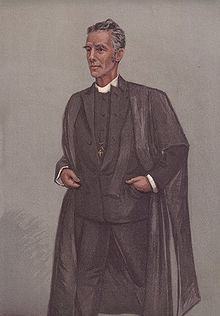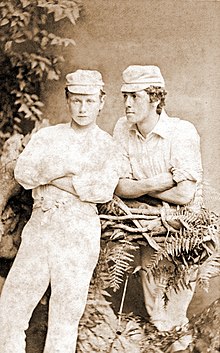Edward Lyttelton
 | |||||||||||||||||||||||||||
| Personal information | |||||||||||||||||||||||||||
|---|---|---|---|---|---|---|---|---|---|---|---|---|---|---|---|---|---|---|---|---|---|---|---|---|---|---|---|
| Full name | Edward Lyttelton | ||||||||||||||||||||||||||
| Born | 23 July 1855 Westminster, London, England | ||||||||||||||||||||||||||
| Died | 26 January 1942 (aged 86) Lincoln, Lincolnshire, England | ||||||||||||||||||||||||||
| Batting | Right-handed batsman | ||||||||||||||||||||||||||
| Role | Batsman | ||||||||||||||||||||||||||
| Domestic team information | |||||||||||||||||||||||||||
| Years | Team | ||||||||||||||||||||||||||
| 1875–1878 | Cambridge University | ||||||||||||||||||||||||||
| 1878–1882 | Middlesex | ||||||||||||||||||||||||||
| Career statistics | |||||||||||||||||||||||||||
| |||||||||||||||||||||||||||
Source: CricketArchive, 7 September 1882 | |||||||||||||||||||||||||||
Rev. Hon. Edward Lyttelton (23 July 1855 – 26 January 1942) was an English sportsman, schoolmaster and cleric from the Lyttelton family. He played first-class cricket for Cambridge University and Middlesex as well as representing the England national football team.
Life
Lyttelton was educated at Eton College followed by Trinity College, Cambridge.[1] At Cambridge, he was a member and club librarian of the University Pitt Club.[2]
He came from a sporting family, with five brothers playing first-class cricket, Alfred, Charles, George, Arthur ("Right") and Robert. His father, George Lyttelton, 4th Baron Lyttelton, was a British aristocrat and Tory politician. His brother-in-law, Cyril Alington, was a scholar who later wrote a book called Edward Lyttelton: An Appreciation.
From 1880 to 1882, Lyttelton worked as an assistant master at Wellington College, and then at Eton College during which time he was ordained in 1886 following residence at Cuddesdon College. He was appointed Headmaster of Haileybury College in 1890, where he remained until 1905. Lyttelton was a canon of St Albans Cathedral from 1895 to 1905.
Between 1905 and 1916 he was the Head Master of Eton College.[3] While at Eton Lyttelton continued the reforms introduced into the curriculum by his predecessor Edmond Warre which resulted in boys being able to enter the school having done no Greek, and being able to specialize in mathematics, modern languages, science, or history. His Christian principles made his position difficult after the outbreak of the First World War, especially after he preached a sermon at St Margaret's, Westminster, in March 1915, in which he said that the whole German nation should not be condemned and that any peace settlement should be generous. This led to a public storm of protest, and perhaps partly as a result Lyttelton resigned in 1916.
He gave up school mastering and worked through his spiritual problems as a parish priest, becoming in 1917 a curate to the Revd. Richard "Dick" Sheppard at St Martin-in-the-Fields and then from 1918 to 1920 working as rector of the small parish of Sidestrand in Norfolk. He became dean of Whitelands College, Chelsea, a teacher training college for women, in 1920, acting as chaplain and lecturer on the Bible. He retired in 1929 after a serious operation, to Norwich where he was an honorary canon 1931–1941.
Sporting career

A right-handed middle order batsman, Lyttelton had his best season in 1878 when he amassed 779 runs at 29.96, helping Middlesex to finish as joint Champions.[4] He scored his only first-class hundred that year, an innings of 113 which he made while playing for Middlesex against the touring Australian side, at Lord's. His century stood out as it occurred in the fourth innings, was double the next highest score in the match by either team (56) and was made despite Middlesex being bowled out for just 185.[5] According to Wisden, Lyttelton's last 76 runs came in only 74 minutes.[6] In the same season, Lyttelton took the only wicket of his first-class career, Yorkshire opening batsman George Ulyett, who also batted for England. He dismissed him, caught and bowled, in a match for Cambridge University against Yorkshire.[7] Aside from Cambridge University and Middlesex he also represented the Gentlemen cricket team, I Zingari, Marylebone Cricket Club and the South of England cricket team.[8]
Lyttelton's only full football international came in a 7–2 defeat by Scotland on 2 March 1878.[9] Another significant achievement in the sport was playing in the 1876 FA Cup Final with the Old Etonians F.C., as a defender, which they lost to the Wanderers on a replay. When picked for England he had been representing Cambridge University.
References
- ^ "Lyttelton, the Hon. Edward (LTLN874E)". A Cambridge Alumni Database. University of Cambridge.
- ^ Fletcher, Walter Morley (2011) [1935]. The University Pitt Club: 1835–1935 (First Paperback ed.). Cambridge: Cambridge University Press. pp. 84–85. ISBN 978-1-107-60006-5.
{{cite book}}: Cite has empty unknown parameter:|month=(help) - ^ Oxford Dictionary of National Biography
- ^ "First-class Batting and Fielding in Each Season by Edward Lyttelton". CricketArchive.
- ^ "Middlesex v Australians 1878". CricketArchive.
- ^ "Edward Lyttelton". Cricinfo.
- ^ "Cambridge University v Yorkshire 1878". CricketArchive.
- ^ "First-class Batting and Fielding For Each Team by Edward Lyttelton". CricketArchive.
- ^ "Edward Lyttelton". England F.C. Archived from the original on 2 December 2008.
- Use dmy dates from August 2013
- 1855 births
- 1942 deaths
- English cricketers
- Free Foresters cricketers
- Cambridge University cricketers
- Middlesex cricketers
- Gentlemen cricketers
- Head Masters of Eton College
- English footballers
- England international footballers
- Cambridge University A.F.C. players
- Old Etonians F.C. players
- People educated at Eton College
- 20th-century English Anglican priests
- I Zingari cricketers
- Lyttelton family
- Alumni of Trinity College, Cambridge
- Marylebone Cricket Club cricketers
- North v South cricketers
- Gentlemen of England cricketers
- Association football defenders

